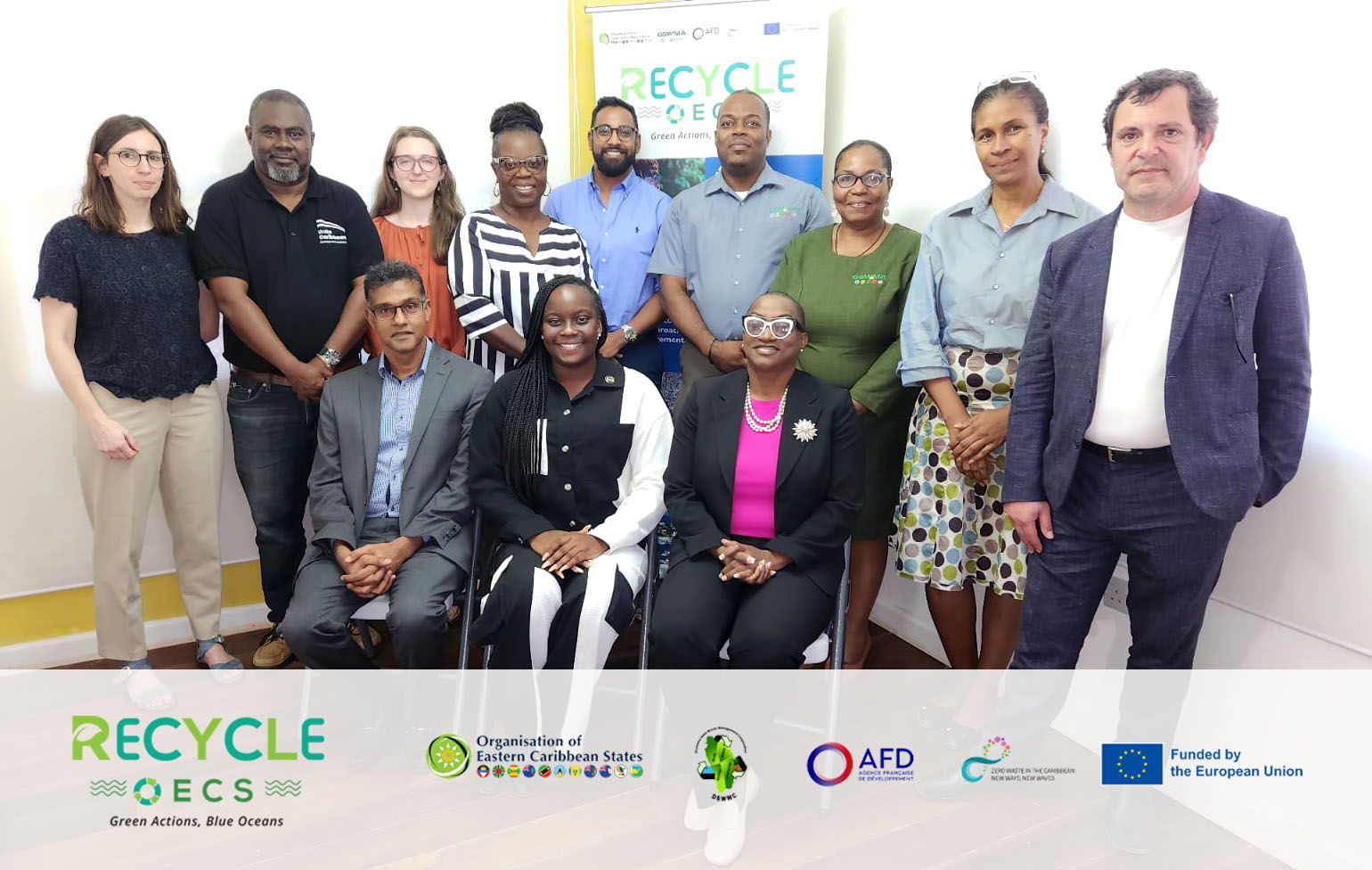Recycle OECS Model Demonstration Countries Decide on the Best Options for Plastic Collection Systems
OECS Media Release
February 5, 2024 — Dominica and Grenada, the two OECS Member States implementing Recycle OECS Model Demonstration Projects, have determined the mechanisms that are most feasible for the collection and processing of recyclable plastic in their countries.
This milestone is significant for the finalisation of mechanisms under the technical pillar of the Recycle OECS Model, which focuses on a financially sustainable separation, collection, and processing system. The remaining pillars focus on economical, financial, regulatory or institutional, and communications (Social) requirements for a sustainable model.
The Dominica Solid Waste Management Corporation (DSWMC) will retain curbside collection, having operated an established system since 2011. Dominica is the only English-speaking Caribbean country to operate Curbside collection for recyclable glass bottles, plastic bottles, and tin cans. The DSWMC will continue to process through sorting and baling of the segregated plastics collected at its recycling facility at the Fond Cole Landfill.
Analysis is currently being done to determine the needs of the DSWMC to strengthen the operational efficiency of its collection system, increase collection capacity, increase island-wide coverage, and process recyclable plastic for export. To achieve this, under the Recycle OECS Project, the DSWMC is receiving technical advice, increased staffing, training, and equipment, including communication support.
In Grenada, the establishment of a dedicated multipurpose recycling facility at Queen’s Park in St. Georges is already in effect. The facility will be retrofitted to process recyclable metals, glass, plastics, and other recyclables for export. Depots, bins in public spaces, and collection from hotels will be the primary modes of collection. The Grenada Solid Waste Management Authority (GSWMA) will retain the services of existing waste collection contractors for transportation to the Facility. The Queen’s Park Multi-Purpose Recycling facility is on track for full commissioning by the end of the first quarter.
On Monday, January 29, the GSWMA met with executives of the Grenada Tourism Authority and hotels to present and discuss the plans for the new Recycling Facility. Coming out of this dialogue, approximately 90% of Grenada’s large resorts pledged in principle to assume an active role in the recycling value chain. This will take the form of systems for on-site separation, responsibility for the delivery of recyclable plastics to the Recycling Facility, and also through collaboration with the GSWMA in areas such as schools and community outreach, and education.
On Tuesday, January 30, the GSWMC hosted a high-level delegation from the Ministry of Climate Resilience, The Environment and Renewable Energy for a walk-through of the proposed Recycling Facility. Led by the Minister for Climate Resilience, the Environment, and Renewable Energy, the Hon. Kerryne James, Permanent Secretary Ms. Peron Johnson, and Special Advisor and Head of the Environment Division Ms. Aria St. Louis. The contingent also included members of the Seureca/Unite Caribbean Joint Venture technical team supporting the GSWMC in the implementation of the Project.
Targets for the collection and processing of recyclable plastic under the two Model Demonstration projects have been set at a combined total of 80 tonnes of PET plastics and 20 tonnes of HDPE plastics by the project's completion date of December 2024. Both the DSWMC and the GSWMA resource recovery teams have received training on efficient methods for handling, upcycling, or exporting the targeted recyclable materials.
For sustainability and to minimize carbon emissions and market price fluctuations in shipping and plastics, collected recyclables will be sent to recycling facilities in Latin America and the Caribbean
About Recycle OECS
The Recycle OECS Project is funded by the European Union, in collaboration with CARIFORUM, and implemented by Agence Française de Développement (AFD) in partnership with the Organisation of East Caribbean States (OECS).
The purpose of the RecycleOECS project is to undertake a comprehensive assessment of the OECS waste management sector, and develop and implement a model waste separation, collection, and recycling programme for the OECS that considers a regional approach, self-financing, sustainability, and business viability.
Danny Moonie
OECS Communications Unit
